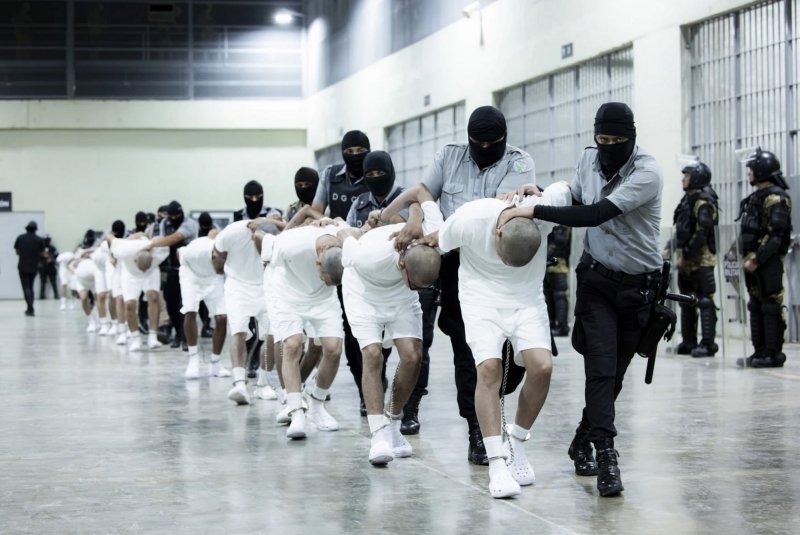Alleged members of the violent Venezuelan street gang Tren de Aragua are escorted to their cells at the maximum-security Terrorism Confinement Center in Tecoluca, El Salvador, on March 16 after the Trump administration used the Alien Enemies Act of 1798 to deport suspected gang members. Photo via El Salvador Presidential Press Office/UPI |
License PhotoMarch 26 (UPI) — A federal appeals court panel on Wednesday ruled 2-1 in favor of a lower court’s restraining order against the Trump administration deporting alleged gang members under the 1798 Enemy Aliens Act.
In the District of Columbia, the three-judge panel in a 93-page decision upheld U.S. District Court Judge James Boasberg’s restraining order that was entered March 15 after the Trump administration flew more than 200 alleged members of the Venezuelan Tren de Aragua gang to El Salvador.
Boasberg said the Venezuelan migrants were not given their due process before the deportations in the two planes.
Judge Karen LeCraft Henderson, an appointee of President George H.W. Bush, and Judge Patricia Millett, an appointee of President Barack Obama, ruled in favor of continuing Boasberg’s restraining order, which only applies to deportations citing the Enemy Aliens Act.
Justin Walker, appointed by Donald Trump in his first term, dissented.
Trump recently declared Tren de Aragua a terrorist organization and sought to have its alleged members deported as enemy aliens.
Henderson said Boasberg’s restraining order only applies to deportations related to the Enemy Aliens Act and only long enough for those subject to deportations to undergo due process while giving each a chance to argue the case in a court of law.
Millett said upholding the restraining order would “do nothing more than freeze the status quo until weight and unprecedented legal issues can be addressed through a soon-forthcoming preliminary injunction proceeding.”
During a hearing Monday, she said “Nazis got better treatment under the Alien Enemies Act than has happened here. During World War II, Nazis appeared before hearing boards under Franklin D. Roosevelt‘s administration.
“No president has ever used this statute this way,” she said.
The act was invoked during World War II to put noncitizens of Japanese, German and Italian descent in internment camps. The federal government formally apologized in 2021 for doing that decades later.
The federal government can continue deporting unlawful migrants using other legal means, she said while acknowledging the alleged Tren de Aragua members who have been deported “may be unpopular.”
“If the government can choose to abandon fair and equal process for some people, it can do the same for everyone,” Millett said.
Boasberg entered his restraining order in the matter, to which the Trump administration sought an expedited appeal.
Justice Department attorney Drew Ensign argued on behalf of the Trump administration during an expedited hearing Monday and said Boasberg’s ruling interferes with Trump’s administrative powers as president.
Millett questioned the rapid deportation of the alleged gang members to El Salvador soon after Trump signed a proclamation authorizing the use of the 1798 Enemy Aliens Act to deport Venezuelans identified as members of the Tren de Aragua gang.
Walker, in his decent, said the case should have been filed in the Southern District of Texas instead of the District of Columbia because that is where they allegedly are being held.
“The problem for the Plaintiffs is that habeas claims must be brought in the district where the Plaintiffs are confined. For the named Plaintiffs at least, that is the Southern District of Texas,” Walker wrote.
Attorney Genera Pam Bondi on Sunday told media she intends to appeal the matter to the Supreme Court if necessary, which is the case after Wednesday’s appellate court ruling.
Boasberg had ordered the Trump administration to provide more information regarding the deportations and accused it of ignoring his ruling when it did not provide the requested information.
The DOJ’s reply brief accused Boasberg of attempting to “pry sensitive information from the government” through “intrusive inquiries.”
The DOJ said Trump administration is declaring the deportations a matter of state secrets that preclude it from cooperating with Boasberg’s order.
“These removals both complied with the law and safeguarded Americans against members of a foreign terrorist organization,” the DOJ said in a 14-page document filed Tuesday. “The Government will continue to defend the removals before this Court and, if necessary, on appeal challenging this Court’s two injunctions issued on March 15.”
The district judge had asked for details why the White House did not obey his order to return two planes carrying alleged Tren de Aragua gang members back to the United States.
Plaintiffs’ attorney Lee Gelernt of the ACLU, said: “There was no process,” and migrants “were designated without any advance notice and rushed onto planes.”
A U.S. Immigration and Customs Enforcement subsequently acknowledged in a sworn declaration that “many” of the noncitizens deported did not have criminal records in the United States.
